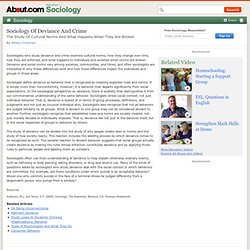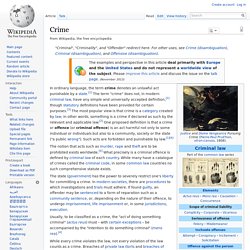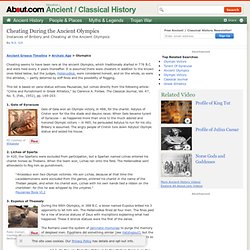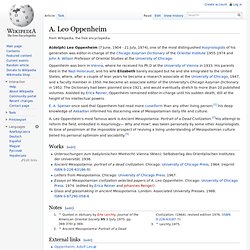

Sociology Of Deviance And Crime. Sociologists who study deviance and crime examine cultural norms, how they change over time, how they are enforced, and what happens to individuals and societies when norms are broken.

Deviance and social norms vary among societies, communities, and times, and often sociologists are interested in why these differences exist and how these differences impact the individuals and groups in those areas. Sociologist define deviance as behavior that is recognized as violating expected rules and norms. It is simply more than nonconformity, however; it is behavior that departs significantly from social expectations. In the sociological perspective on deviance, there is subtlety that distinguishes it from our commonsense understanding of the same behavior.
Sociologists stress social context, not just individual behavior. The study of deviance can be divided into the study of why people violate laws or norms and the study of how society reacts. Resources Andersen, M.L. and Taylor, H.F. (2009). Crime. In ordinary language, the term crime denotes an unlawful act punishable by a state.[1] The term "crime" does not, in modern criminal law, have any simple and universally accepted definition,[2] though statutory definitions have been provided for certain purposes.[3] The most popular view is that crime is a category created by law; in other words, something is a crime if declared as such by the relevant and applicable law.[2] One proposed definition is that a crime or offence (or criminal offence) is an act harmful not only to some individual or individuals but also to a community, society or the state ("a public wrong").

Such acts are forbidden and punishable by law.[1][4] Usually, to be classified as a crime, the "act of doing something criminal" (actus reus) must – with certain exceptions – be accompanied by the "intention to do something criminal" (mens rea).[4] While every crime violates the law, not every violation of the law counts as a crime. Overview[edit] Etymology[edit] History. Bribery and Cheating at the Ancient Olympics. Ancient Greece Timeline > Archaic Age > Olympics Cheating seems to have been rare at the ancient Olympics, which traditionally started in 776 B.C. and were held every 4 years thereafter.

It is assumed there were cheaters in addition to the known ones listed below, but the judges, Hellanodikai, were considered honest, and on the whole, so were the athletes, -- partly deterred by stiff fines and the possibility of flogging. This list is based on zane-statue witness Pausanias, but comes directly from the following article: "Crime and Punishment in Greek Athletics," by Clarence A. Forbes. The Classical Journal, Vol. 47, No. 5, (Feb., 1952), pp. 169-203. Cheating is as old as the Olympics. Anticipation builds for the opening ceremony of the Summer Olympics on Friday, July 27, at the Olympic Stadium in London.

The 2012 Games will run through August 12. The sun sets behind the Tower Bridge in London hours before the opening ceremony of the 2012 Olympic Games on Friday. South Korean archer Im Dong Hyun celebrates breaking the first world record of the London Olympics on Friday. The two-time gold medalist, who is classified as legally blind and can't see out of his right eye, bettered his own 72-arrow mark in the qualification competition. Kaori Kawanaka of Japan, Pia Lionetti of Italy and Tetyana Dorokhova of Ukraine retrieve their arrows Friday during the archery ranking round on opening day of the Olympics in London. Brady Ellison of the United States prepares for the archery ranking round on Olympics opening day in London. A Belgian cyclist rides during a track cycling practice session ahead of the 2012 Olympic Games on Friday in London.
Olympics get under way David Potter. A. Leo Oppenheim. Oppenheim was born in Vienna, where he received his Ph.D at the University of Vienna in 1933.

His parents died in the Nazi Holocaust, and his wife Elizabeth barely escaped but he and she emigrated to the United States, where, after a couple of lean years he became a research associate at the University of Chicago, 1947, and a faculty member in 1950. He became an associate editor of the University's Chicago Assyrian Dictionary in 1952. The Dictionary had been planned since 1921, and would eventually stretch to more than 20 published volumes. Assisted by Erica Reiner, Oppenheim remained editor-in-charge until his sudden death, still at the height of his intellectual powers. E. A. Works[edit] Untersuchungen zum babylonischen Mietrecht. Notes[edit] External links[edit] Oppenheim, Adolf Leo. The new Oxford companion to law - Peter Cane, Joanne Conaghan. For any reader needing a concise yet expert explanation of a subject in law, the New Oxford Companion to Law is the ideal reference work.

Providing greater depth than can be found in legal dictionaries but always accessible to the non-specialist, entries in the Companion cover all areas of law and legal systems and are extensively cross-referenced for ease of navigation.